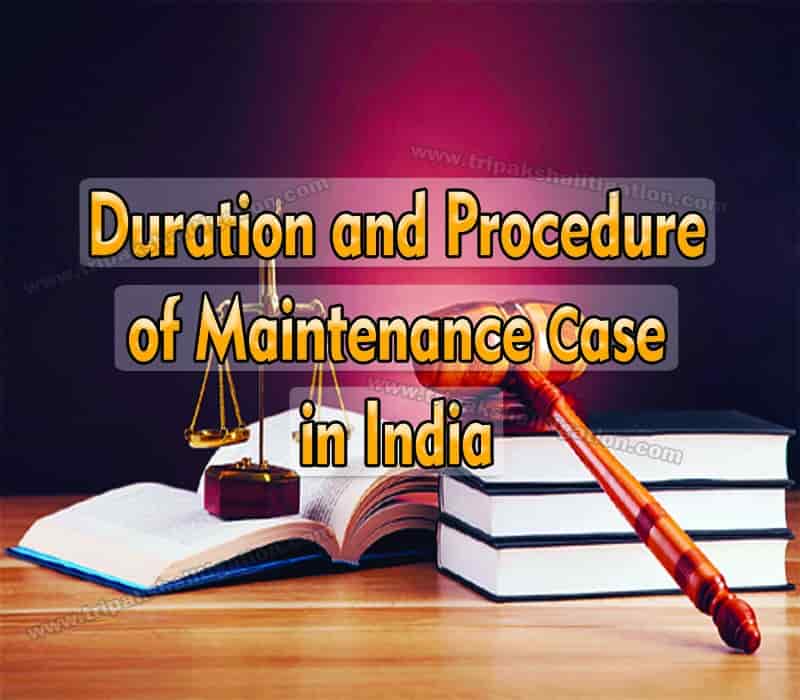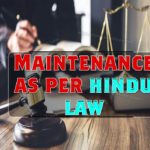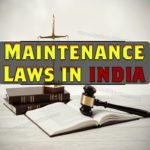Introduction
The term ‘maintenance’ is defined as an amount payable by the husband to his wife who is unable to maintain herself either during the subsistence of marriage or upon separation or divorce. The terms ‘maintenance’ and ‘alimony’ have been used interchangeably, the term alimony means an allowance or amount which a court orders the husband to pay to the wife for her sustenance. The husband must maintain his wife and this obligation arises in marriage. Such obligations are imposed on him by operation of law. In this article, we will discuss maintenance for wives under secular law.
In India, majorly five communities are identified including Hindus, Muslims, Christians, Jews, and Parsi. These communities have their laws derived from customs/traditions and laws. The law on maintenance and alimony varies from one community to another. For instance, under the Hindu Marriage Act, 1955, both the wife and the husband are legally entitled to claim maintenance but under the Special Marriage Act, 1954, only the wife can claim permanent alimony and maintenance.
Who is a wife in the eyes of law?
In Chanmuniya v. Virender Kumar Singh Kushwaha- The Court held that the term ‘wife’ is very broad and it also includes those cases where a man and woman have been living together as husband and wife for a reasonably long period. The court further clarified that strict proof of marriage should not be a pre-condition for maintenance.
In another case of Badshah v. Sou. Urmila Badsha Godse & Anr.- The Apex Court held that the victims of bigamous marriage are entitled to maintenance. It clarified that if a man deceitfully marries a woman hiding the substitution of earlier marriage then he shall be obliged to pay maintenance u/s 125 of CrPC.
Maintenance under Criminal Code
In India, Section 125 of the Code of Criminal Procedure, 1973 (for short ‘CrPC’) deals with the concept of maintenance along with the different personal laws extending the right of maintenance not only to the wife but also to her parents and children. It must be noted that the wife, children, and parents can claim maintenance under the said legal provision. It is a secular law and applies to all irrespective of their religion.
Order for maintenance of wives, children, and parents
If any person having sufficient means neglects or refuses to maintain
- His wife, unable to maintain herself, or
- His legitimate or illegitimate minor child, whether married or not, is unable to maintain itself, or
- His legitimate or illegitimate child (not being a married daughter) who has attained majority, where such child is because of any physical or mental abnormality or injury unable to maintain itself, or
- His father or mother, unable to maintain himself or herself, then an application for claiming maintenance can be filed against him in the court having jurisdiction.
Personal laws regarding maintenance apply to people belonging to different religions, however, the maintenance u/s 125 of the CrPC can be claimed by anyone irrespective of religion or caste. A wife can also claim maintenance under the Protection of Women against Domestic Violence Act, 2005.
In the case of Shantha v. B.G. Shivananjappa- It was held by the court that Section 125 CrPC is a measure of social legislation and is to be construed liberally for the welfare and benefit of the wife & children.
Maintenance under Hindu Laws
According to Section 18(1) of the Hindu Adoptions and Maintenance Act 1956, the wife can claim maintenance and it is her legal right. Further, Section 18(2) of the said Act provides that a Hindu wife shall be entitled to live separately from her husband without forfeiting her claim to maintenance if he has any other wife living.
The Act envisages certain situations in which it may become impossible for a wife to continue to reside and cohabit with the husband but she may not want to break the matrimonial tie for various reasons ranging from growing children to social stigma.
In the case of Kusum Sharma v. Mahinder Kumar Sharma- It was held by the court that the maintenance is not only a constitutional privilege but it is a part and parcel of universal human rights. It is awarded to avoid vagrancy arising from strained husband-wife relationships, and for ensuring that the indigent litigating spouse is not disabled due to lack of money in defending or prosecuting the case.
Maintenance under Muslim Laws
Under Muslim law, maintenance has been provided under the Muslim Women (Protection of Rights on Divorce) Act, 1986. It states that a divorced Muslim woman is to be maintained in the following cases:
- During the period of iddat: Reasonable and fair maintenance must be paid to the wife;
- Mehr/dower agreed between the parties at the time of marriage/after the marriage must be paid to the wife;
- All property was given to her by her relatives, friends, or husband before, at the time, or after.
Maintenance under Parsi Laws
In India, the Parsi Marriage and Divorce Act, of 1936 provides the right to maintenance to a Parsi woman. Various factors are considered while determining the maintenance to the wife such as the husband’s earnings, his property, other assets, etc.
Maintenance under Christian Laws
Amongst Christians, the maintenance is governed by the Indian Divorce Act, 1869. As per Section 37 of the Act a wife can apply for maintenance in a Civil Court or High Court.
Timeline for disposing of interim maintenance case
In the case of Mithilesh Maurya v. State of U.P.- Justice Y.K. Srivastava stated that “Proceeding for interim maintenance, shall as far as possible, be disposed of within 60 days from the date of service of notice on the husband.”As per the third proviso to Section 125 CrPC, a timeline is provided wherein it is stated that the proceeding for interim maintenance must be disposed of within 60 days from the date of service of notice on the husband.
Guidelines by the Supreme Court
Rajnesh v. Neha & Anr.– In this case, the court issued guidelines on certain aspects about payment of maintenance in matrimonial disputes. It laid down the following guidelines:
- The issue of overlapping jurisdiction under different enactments for payment of maintenance;
- Payment of interim maintenance;
- Criteria for determining the quantum of maintenance;
- Date from which maintenance is to be awarded; and
- Enforcement of orders of maintenance.
Procedure, Alteration, and Enforcement of maintenance order
Filing of an application
U/s 125 CrPC an application can be moved by the wife based on the following two conditions:-
- The husband has sufficient means and;
- He neglects or refuses to maintain his wife, who is unable to maintain herself
Where an application is to be filed?
An application for maintenance may be filed against any person, liable to pay the same, in a District Court, where:
- The husband resides; or
- The wife resides, or
- The husband last resided with his wife.
Person avoiding service of summons
If the Magistrate is satisfied that the person against whom an order for payment of maintenance is passed is willingly avoiding the service of summons, or avoiding his attendance in the Court. The Magistrate can pass ex-parte orders.
Application for setting aside the ex-parte order
If an application is moved to set aside the ex-parte order, then the Magistrate will examine the same. Application is to be made within three months from the date of passing the order. The Court in dealing with applications u/s 125 of the CrPC shall have the power to make such order as to costs as may be just.
In the case of Mohd. Naim Siddiqui v. Sultana Khatoon- The Court clarified that an ex-parte order u/s 125 CrPC to be set aside where the husband was not served.
Evidence collection
It is carried out in presence of the person against whom the order of payment of maintenance is passed or in his absence in the presence of his pleader. The evidence is to be recorded in a manner as prescribed in the summons case.
In Ajay Gupta v. Sonia Gupta- The High Court of Delhi held that the Family Court can accept evidence by way of affidavit in maintenance cases even though Section 126 of the CrPC prohibits.
Enforcement of maintenance orders
You will receive an order copy of maintenance or interim maintenance and expenses of proceeding free of costs. For the execution of the maintenance order, you have to apply to the Magistrate at the place where the opposite party liable to make the payment may be as per Section 128 of the CrPC.
Alteration or cancellation of the amount of maintenance awarded
The Magistrate can pass an order of alteration if there is any change in the previous circumstance such as financial crises of the husband, or the wife starts earning, etc.
The Magistrate after being satisfied may also cancel the maintenance in the following circumstances i.e. if the woman has:
- Remarried after attaining divorce;
- Started earning well;
- Divorced her husband and had willfully surrendered her rights of maintenance as interim maintenance (after getting a divorce).
Enforcement of order of maintenance
A copy of the order of maintenance or interim maintenance shall be given to the person against whom the order is passed. The order may be enforced by any Magistrate in any place where the person against whom it is made maybe.
Conclusion
The Court determines various factors while granting maintenance to a wife, the prime factors are the husband’s status and his income. Whereas the court also takes into consideration whether the wife is educated and capable to earn, if so, then it decides the alimony/ maintenance according to the same. You need to fight your case wisely and take legal advice before putting forth any claims in court.
JT 2010 (11) SC 132
(Cr.A.No.19530/2013)
Ahmad Khan v. Shah Bano Begum [1985 (1) SCALE 767
https://districts.ecourts.gov.in/sites/default/files/1-Maintenance%20-%20by%20Smt%20YJ%20Padmasree.pdf
(2005) 4 SCC 468
2017 SCC OnLine Del 11796
All HC | Does S. 125 CrPC provide a timeline for disposing of proceedings pertaining to interim maintenance? Read What HC says
Application u/s 482 no. – 19612 of 2020, decided on 08-01-2021
Criminal Appeal No. 730 of 2020 arising out of SLP (Cri) No. 9503 of 2018)
http://kanoon.nearlaw.com/2017/12/30/procedure-alteration-enforcement-maintenance-order/
1983 SCC (Criminal) 103
https://www.latestlaws.com/latest-news/family-court-can-accept-evidence-by-way-of-affidavit-in-maintenance-cases-even-if-sec-126-crpc-prohibits-it-rules-hc
CRL.REV.P. 523/2019 & CRL.M.A. 9437/2019








